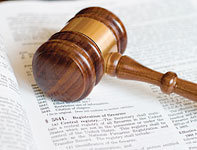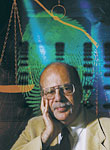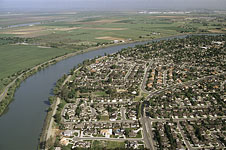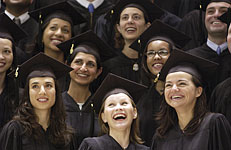Volume 26 · Number 1 · Fall 2008
100 Ways
that UC Davis Has Transformed the World
Law and politics
Serving while learning.
UC Davis professional students make a difference every day in the lives of Californians — providing medical care at five free clinics for underserved populations; legal representation for low-income people on civil rights, family law, prisoner rights and immigration law; and veterinary care for the pets of the homeless. In addition, management students offer consulting service to business, government and nonprofit organizations.
Gay and lesbian issues.
Faculty from a wide range of disciplines have advanced understanding of gay and lesbian issues. Psychology professor Gregory Herek, whose research has focused on hate crimes, was among the leading mental health authors of an amicus curiae brief submitted to the California Supreme Court for its consideration in the state’s 2007 decision legalizing gay marriage.
Ensuring justice for all.
As the first public law school in California to launch a loan forgiveness program for public-interest lawyers, UC Davis makes it easier for young attorneys to enter the field. Indeed, despite rising law-school tuition, about 25 percent of the School of Law’s graduates go into public-interest law. UC Davis also offers a certificate program in public service law and operates four student-run legal clinics that serve clients who have limited access to justice.
Rescuing Mono Lake.
Students, faculty and alumni played pivotal roles in the campaign to save Mono Lake in the eastern Sierra, ranging from sounding the first alarms to drafting the final order to restore the lake’s water supply.
Economic advice.
Economists in the UC Davis departments of economics and agricultural and resource economics have served presidents and advised governors, informing the farm subsidy debate, tax policy, labor discussions and international trade issues, to name a few. UC Davis is also a resource for scholars elsewhere: It houses the Center for International Data, which contains more information on global trade than anyplace else in the world, and two of its faculty authored the Historical Statistics of the United States (millennial edition), a 4,000-page, five-volume reference work regarded as the most complete statistical source on the U.S.
Fuel standards.
The fuel you pump into your car or truck will be getting greener, thanks in part to the work of UC Davis professors. In January 2007, Gov. Arnold Schwarzenegger announced the world’s first low-carbon fuel standard for transportation fuels. It requires gasoline and diesel-fuel providers to reduce the carbon intensity of their products sold in California by 10 percent by year 2020 and more thereafter. Three UC Davis professors helped write this groundbreaking standard. In California, transportation fuels account for about 40 percent of all greenhouse-gas emissions.
Saving farmland.
UC Davis scholars helped develop and revise California’s Williamson Act, landmark legislation that offers tax relief to farmers for keeping their land in agriculture. The act covers more than half of the state’s 29 million acres of farmland.
Landmark decision.
The U.S. Supreme Court ruled that race could be considered in university admissions, while forbidding the use of quotas, in a case brought against the UC Regents by Allan Bakke. Bakke’s application for admission to the UC Davis School of Medicine had been rejected in 1973 and 1974, although his scores were higher than those of applicants accepted into 16 positions reserved for minority students. After the ruling, Bakke was admitted, graduating in 1982.

Gun violence.
Lawmakers have implemented California and federal laws restricting sales of assault weapons and improved strategies to prevent gun trafficking by using plenty of hard scientific data developed by UC Davis on the nature of gun violence.
Child victims, child witnesses.
Psychology professor Gail Goodman’s research has played a pivotal role in helping society to balance the need to protect children from abuse with the need to protect innocent adults from false accusations. Her research, which reveals both children’s limitations and strengths as witnesses, was cited most recently in a 2008 U.S. Supreme Court decision that banned the death penalty for child rapists.
Voting integrity.
California election officials tightened security regulations for electronic voting machines in 2007 after government- commissioned teams, one of them led by a UC Davis computer scientist, hacked into models used in 43 of the state’s 58 counties. Many polling places reverted to paper ballots for the 2008 presidential primary.

Scientific evidence.
UC Davis law professor Edward Imwinkelried wrote the book on scientific evidence. The U.S. Supreme Court cited the text in a landmark 1993 case that freed courts to consider evidence derived from new technology even before it became generally accepted.

Levee dangers.
Disaster may be averted in the Sacramento-San Joaquin Delta in the future thanks to science-based advice by UC Davis experts. Warning that the state’s fragile system of levees is susceptible to floods and earthquakes that could affect the supply of water, food, energy and transportation for most people living in California, UC Davis experts haven’t shied away from proposing even controversial solutions.

A world of alumni.
From the time the first students graduated in 1911, UC Davis alumni have been making their mark in the world — and beyond. Among their countless achievements are winning Olympic gold medals, directing Oscar-winning Disney films, heading UNICEF and flying through space as astronauts. With every year, the Aggie impact multiplies. From nine students in the 1911 class, our living alumni total has grown to 185,000.
« Return to 100 ways introduction

